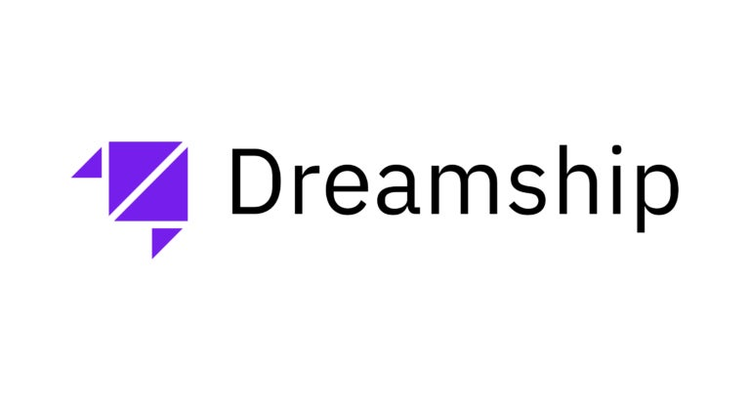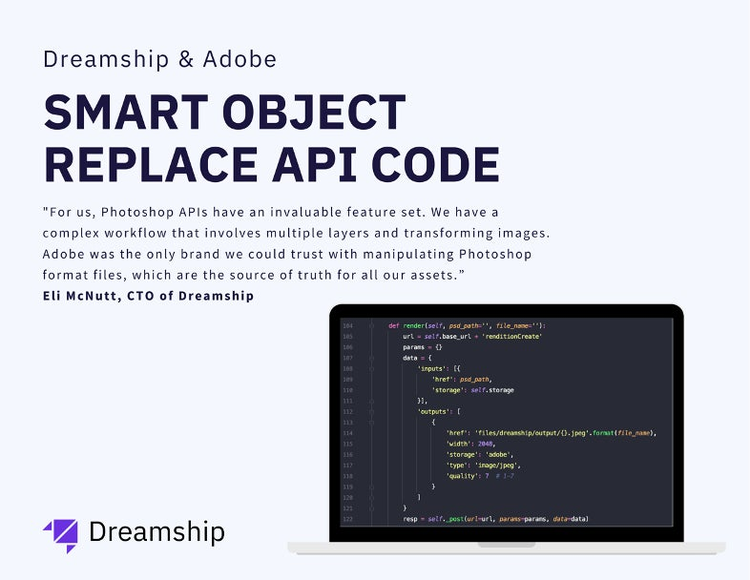How Dreamship used Photoshop APIs to accelerate its growth in e-commerce
Dreamship discovers Adobe.IO and uses Photoshop API solutions to manage complex workflows.

It’s no secret that e-commerce has taken a bigger and bigger share of the overall retail market for the past couple of decades, due to the higher variety of products available, greater level of convenience, and faster shipping times. In 2019, e-commerce made up 14 percent of the worldwide retail sales, and was expected to grow to 22 percent, or $6.5 trillion, by 2023. In 2020, with the COVID-19 pandemic driving fewer people to physical stores, Black Friday & Cyber Monday saw 1 million sales per second. Experts think this growth will continue, even once the pandemic subsides.
A smaller subset of the e-commerce market — Print-on-Demand or POD — has also been growing as consumers look to purchase personalized merchandise for themselves and for their family and friends as gifts. The trend started with t-shirts, but has expanded to other apparel and accessories, such as jackets, pants, hats, socks, pillows, flags and mugs. The combination of improved drop-shipping methods coupled with technological advancements from the likes of Google, Magento (e-comm platform) and Paypal (for payments) have significantly lowered the customer acquisition, production, warehousing, delivery and order fulfillment costs, empowering entrepreneurs to sell their custom printed goods with limited capital investment.
Although these advancements have been overwhelmingly positive for entrepreneurs and consumers, they have also led to a few unscrupulous businesses selling merchandise that infringe trademarks. Dreamship was founded by Bill Bricker, Eli McNutt and Bo Nguyen to address some of the challenges in the Print-on-Demand industry. “Our vision in creating Dreamship was what we call ‘Ethical E-commerce’, where we play the role of a trusted logistics partner between e-commerce companies and their customers. Our goal is to empower millions of e-commerce entrepreneurs everywhere to grow their small businesses and compete on a global playing field. We help to do this by ensuring there are no IP and trademark infringements while also providing a seamless consumer experience on our platform.” says Bill Bricker, CEO of Dreamship.

From the very beginning, Dreamship knew it needed a fast, responsive, high quality imaging solution to enable “virtual inventory” for their e-commerce clients. “Because we offer our customers on-demand printing, there are no actual products until a consumer buys one, which means that providing high fidelity photo-realistic images was critical to a great customer experience for our clients,” says Eli McNutt, CTO of Dreamship.
Initially, Dreamship tried to build their own product mockup solution using open-sourced tools, but it wasn’t a scalable solution. “We then tried looking for third-party imaging API solutions and found one that met our needs in terms of speed and reliability. But as our business grew and we started growing our design and engineering teams to be able to create a greater number of product mockups, we ran into another problem — the API solution required a lot of time and effort from our engineers to take Photoshop files from designers and deconstruct them to allow a variety of mockups. That’s when we realized we needed a solution that would make both the designers’ and developers’ lives easier,“ Eli says.
While looking for more robust solutions, Eli came across Adobe.IO and discovered that Photoshop launched several API solutions, including Smart Object Replace that allows the swapping of images quickly and seamlessly. “For us, Photoshop APIs have an invaluable feature set. We have a complex workflow that involves multiple layers and transforming images (like warping an image around a mug) and Adobe was the only brand we could trust with manipulating Photoshop format files, which are the source of truth for all our assets.”

Dreamship started seeing the impact of using Photoshop APIs almost immediately. They were able to hire more designers without any engineering knowledge to generate product mockups. At the same time, the APIs reduced the time it took them to create mockups from 10-20 hours to less than 30 minutes. Finally, Photoshop APIs have had a huge impact on Dreamship clients as well. “An average client of ours used to showcase thousands of SKUs on their e-commerce sites, but after we started using Photoshop APIs, they are now able to expand their virtual inventory to hundreds of thousands of SKUs,” Bill says.
As of December 2020, from 2019, Dreamship grew its revenue 12x partially due to Photoshop APIs allowing them to expand their virtual inventory capabilities. “We would definitely want to continue using Photoshop APIs in the future, and recommend anyone in the e-commerce space to try it out. It has truly been a game changer for our business and will continue to help us provide value to our customers,” Eli says.
Dreamship brings e-commerce into the modern age, empowering partners to grow existing business and capture new revenue streams with the first and only enterprise Print-On-Demand platform. Dreamship helps partners scale via fast, reliable fulfillment with zero inventory costs through a trusted middleware layer that seamlessly connects a network of digital entrepreneurs & vetted fulfillment partners. To learn more about Dreamship, check out our website.
Adobe Photoshop & Lightroom APIs: The creative world runs on Photoshop. Now you can harness the power of the world’s best imaging and graphic design software to transform your business via a flexible API and extensions built on 30 years of industry-defining innovation. Current features include image cutout, Lightroom presets, auto-tone, and Smart Object replacement. To learn more, visit our Adobe.IO developer website here.